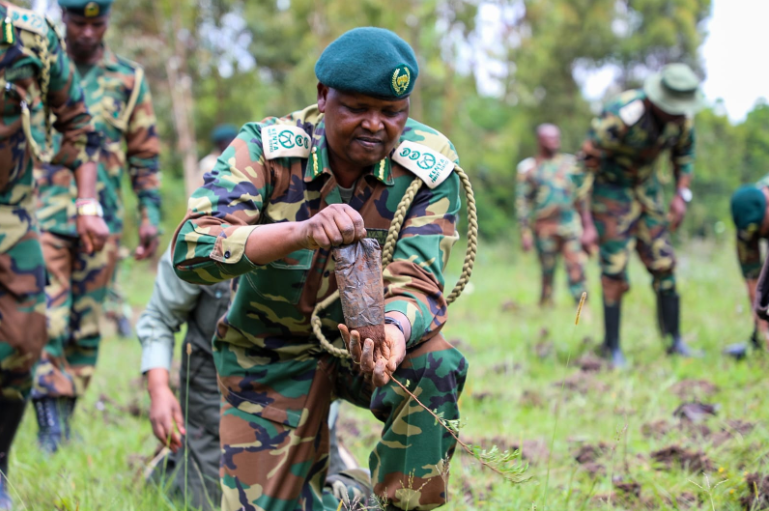The Kenya Forest Service (KFS) is a government agency under the Ministry of Environment, Climate Change & Forestry, charged with managing, conserving, and protecting Kenya’s forests and natural resources. Established under the Forest Conservation and Management Act (FCMA), 2016, KFS plays a central role in ensuring sustainable forest management across the country. With over 1.7 million hectares of public forest land under its care, KFS works diligently to safeguard Kenya’s forest ecosystems, including gazetted forests, game reserves, and national parks.
The agency has 172 forest stations distributed across the country and collaborates closely with local communities, private entities, and other stakeholders to promote forest conservation, even in areas outside gazetted forests. Through initiatives like reforestation, afforestation, and agroforestry, KFS aims to enhance forest productivity while protecting forests from threats such as illegal logging, poaching, and charcoal burning. These efforts are crucial for preserving biodiversity, protecting water catchment areas, and contributing to climate change mitigation.
Key Functions of the Kenya Forest Service (KFS)
Below are the critical functions of KFS as outlined in the Forest Conservation and Management Act (FCMA), 2016:
- Conservation and Management of Public Forests KFS is responsible for the conservation, protection, and management of all public forests in Kenya. This includes ensuring that forests are preserved for their ecological, economic, and social benefits.
- Supporting Community-Based Forest Industries The agency approves the provision of credit facilities and technical training for community-based forest industries. It also provides incentives for the sustainable utilization of both wood and non-wood forest products, ensuring that communities derive value from forests without depleting them.
- Capacity Building for County Governments KFS assists county governments in building their capacity in forestry management, ensuring effective forest management at both local and national levels. This is particularly important since forests fall under both national and county government jurisdictions.
- Promoting Forestry Research In collaboration with relevant stakeholders, KFS identifies forestry research needs and applies research findings to improve forest management. This research supports sustainable practices and helps address emerging challenges, such as climate change and deforestation.
- Recommendation on Forest Boundaries KFS plays an advisory role in determining and recommending changes to the boundaries of public forests, ensuring that the forest coverage is well-protected and can be expanded where necessary.
- Establishing Public Forests KFS recommends the establishment of public forests on unalienated public land or other public lands, thereby expanding Kenya’s forest cover and ensuring more areas are set aside for conservation purposes.
- Geographic Information System (GIS) Database KFS develops, maintains, and updates a geographic information system (GIS) database of all forests in Kenya. This database serves as a critical tool for tracking forest cover, monitoring deforestation, and assessing forest health.
- Benefit-Sharing Arrangements KFS implements benefit-sharing arrangements in accordance with the Forest Conservation and Management Act. These arrangements ensure that local communities benefit from forest resources, fostering goodwill and cooperation in conservation efforts.
- Establishment of Forest Conservancy Areas KFS establishes forest conservancy areas for the conservation and management of forest ecosystems. These areas are crucial for maintaining biodiversity, protecting endangered species, and conserving water catchment areas.
- Regulating Trade in Forest Produce The agency enforces rules and regulations governing the importation, exportation, and trade of forest produce, ensuring that Kenya’s forest resources are utilized sustainably and that illegal trade in forest products is curbed.
- Developing Programs for Tourism and Recreation In collaboration with relevant stakeholders, KFS develops programs for tourism, recreation, and ceremonial use of public forests. These activities contribute to forest conservation by generating income that supports sustainable forest management.
- Water Catchment Management KFS manages water catchment areas, focusing on soil and water conservation, carbon sequestration, and other environmental services. This work is done in collaboration with stakeholders such as the Water Resources Authority and other environmental agencies.
- Forest Status and Resource Assessment Reports KFS is responsible for preparing and submitting a Forest Status Report to the Cabinet Secretary every two years and a Resource Assessment Report every five years. These reports provide crucial insights into the state of the country’s forests and guide policymaking.
- Forest Management Plans KFS prepares and implements management plans for all public forests. It also assists in preparing management plans for community forests and private forests, ensuring that all forest types are managed sustainably.
- Forestry Education and Training The Kenya Forest Service promotes forestry education and training, raising awareness of the importance of forests and equipping individuals and communities with the knowledge and skills needed for effective forest management.
- Licensing and Permit Issuance KFS receives and considers applications for licenses or permits related to the use of forest resources or the management of forests. These permits regulate activities such as logging, charcoal burning, and the collection of forest products.
- Register of Forest Management Plans The agency maintains a register of all forest management plans prepared for public forests. This register ensures transparency and allows stakeholders to access vital information about the management of Kenya’s forest resources.
Collaboration with Stakeholders
KFS collaborates with various stakeholders, including government agencies, communities, private companies, and international organizations. Key partners include:
- Kenya Forestry Research Institute (KEFRI): For research and innovation in forestry.
- National Environment Management Authority (NEMA): For ensuring environmental compliance.
- Kenya Water Towers Agency: For protecting critical water catchment areas.
- Local Communities: Engaged in Participatory Forest Management (PFM) to ensure that communities benefit from conservation efforts.
By working together, these stakeholders contribute to the sustainable management of Kenya’s forest resources.
Contact Information for Kenya Forest Service
- Head Office: Main Registry, NHIF Building, 13th Floor, Ragati Road, Upper Hill, Nairobi
- Phone: 020-2689882
- Toll-Free Number: 0800 721 277
- Email: info@kenyaforestservice.org
The Kenya Forest Service plays an integral role in protecting and managing Kenya’s forest resources. Through its wide range of functions, from conservation to capacity building and forest protection, KFS ensures that forests continue to contribute to the country’s environmental health, economic development, and social well-being. Its efforts are crucial in addressing challenges such as deforestation, climate change, and the sustainable use of natural resources.




